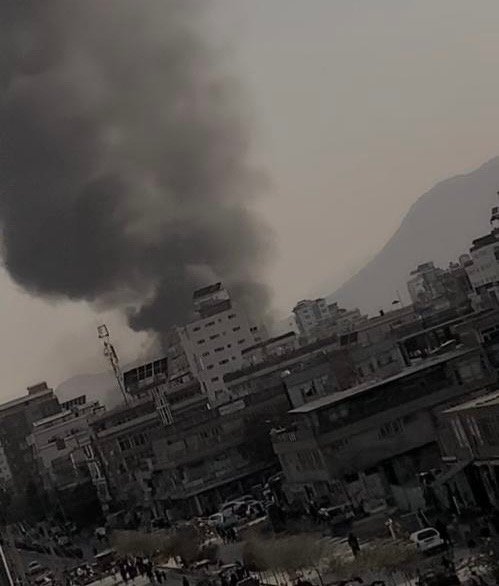Pakistan–Afghanistan Escalation: When the Creator Faces Its Own Creation

Smoke rises moments after Pakistan’s airstrike. Courtesy of @Qazizadah for ADN.
By Rahmatullah Achakzai
The volatile relationship between Pakistan and Taliban-controlled Afghanistan has entered its most dangerous phase since the Taliban’s return to power in 2021. What began as border skirmishes has now evolved into open confrontation. On Wednesday, Pakistan confirmed that its air force conducted strikes in Kabul and Kandahar, targeting what it called “important sites.” Residents of the Afghan capital reported multiple explosions, with fighter jets flying overhead and Taliban vehicles rushing toward the blast sites.
The airstrikes followed days of deadly clashes along the border and escalating accusations between the two sides. Pakistan blames Kabul for sheltering militants from the Tehrik-e-Taliban Pakistan (TTP), responsible for numerous attacks inside Pakistan. The Taliban deny the claim, accusing Islamabad of aggression and interference. After the attacks, both sides agreed to a 48-hour ceasefire, though mutual distrust runs deep.
This confrontation is not just a military conflict — it is a clash of historical dependencies. Pakistan, which once nurtured the Mujahideen during the Soviet occupation of Afghanistan in the 1980s, has long used Afghan militancy as a tool of strategic influence. The Taliban emerged as the second generation of those Mujahideen — equally driven by fanatic Islamist ideology and equally dependent on Pakistan’s patronage. For decades, Islamabad’s military and intelligence services provided them with logistical, financial, and training support. Now, however, the creation has turned against its creator. The Taliban’s refusal to act against the TTP and its growing assertiveness have alarmed Pakistan, leading to this dangerous spiral of retaliation.
A Divided Diaspora and Rising Voices Against Hypocrisy
The strikes have not only intensified regional tensions but also split the Afghan diaspora, revealing deep ideological and emotional divides. Among exiled Afghans, particularly those once linked to the former republic, some have welcomed Pakistan’s airstrikes as a blow against Taliban extremism. Mustafa Mastoor, a former deputy finance minister, wrote on X:
“We welcome the targeting of terrorists from any side and anywhere, even within our own country. Pakistan and other countries have now realized that the Taliban’s policies serve neither Afghans nor themselves — this is an opportunity.”
Others, however, see Pakistan’s actions as another chapter of aggression by a state that has long undermined Afghanistan’s sovereignty. Fazel Fazly, a close aide to former president Ashraf Ghani, wrote in Pashto:
“The Punjabi army, to cover its collapsing economy and political crisis, and after apparently receiving a green light from the U.S., is now brutally bombing Afghan soil. This same army, which once lobbied for a peace prize for Trump, today openly calls Afghans — whether in Kabul or Khyber Pakhtunkhwa — enemies. But such naked aggression will ultimately shatter this artificial state created by colonial powers.”
From outside the region, the criticism has been equally sharp. The former U.S. ambassador to Afghanistan, writing in Farsi, called Pakistan’s concern for the Afghan people “hypocritical,” pointing out that Islamabad’s military has for decades supported instability in Afghanistan while suppressing democracy at home. “Instead of offering unsolicited advice to others,” he wrote, “Pakistan’s leaders should focus on the chaos they have created within their own borders — and resolve the insurgencies raging in Balochistan and Khyber Pakhtunkhwa.”
Meanwhile, former Afghan Vice President Amrullah Saleh added another dimension, arguing that Afghanistan currently lacks the legitimate state institutions — a constitution, a parliament, and a recognized government — necessary to define war and peace. “Until a legitimate and dignified system is restored,” he wrote, “no political force has the right to define national defense or represent Afghanistan’s sovereignty.”
This internal division among Afghans — between those who see Pakistan’s actions as justice against tyranny and those who see them as aggression against the motherland — underscores a deeper identity crisis. For decades, foreign interventions and proxy wars have blurred the lines between national resistance and external manipulation.
As bombs fall over Kabul and Kandahar, the irony is impossible to ignore: Pakistan is now being haunted by the very militant apparatus it once built. The Taliban, born from Pakistan’s strategic depth doctrine, are asserting independence in ways their patrons never intended. Yet for ordinary Afghans — whether in exile or at home — it is again their land and lives caught between the ambitions of neighbors and the failures of their rulers.
The ceasefire may halt the gunfire temporarily, but the wounds — political, historical, and emotional — will take far longer to heal.
Rahmatullah Achakzai is a journalist based in Balochistan, covering human rights, regional politics, and cross-border issues.
Note: The contents of the article are of sole responsibility of the author. Afghan Diaspora Network will not be responsible for any inaccurate or incorrect statement in the articles.






